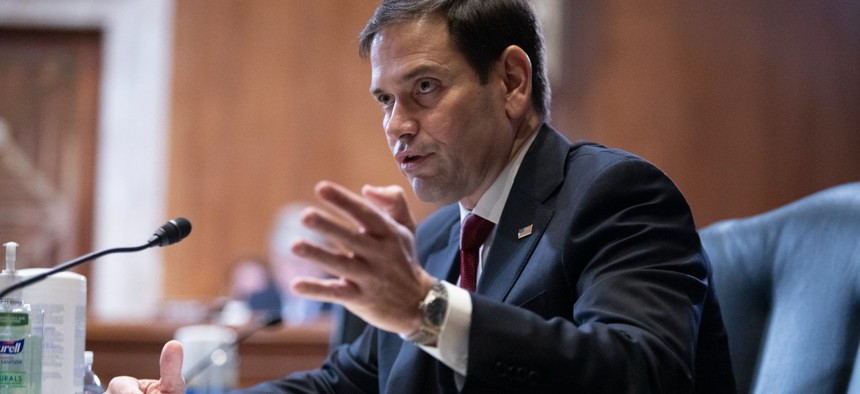
Sen. Marco Rubio, R-Fla., is one of the senators who had placed a hold in April. Anna Rose Layden-Pool/Getty Images
Most of Biden's TSP Nominees Are Free to Be Confirmed, Now That GOP Senators Have Lifted a Hold
The lawmakers changed course after the nominees committed to being “highly skeptical” of proposals to include Chinese investments in the Thrift Savings Plan’s offerings.
Republican senators on Thursday announced that they had lifted their hold that had made it more difficult for President Biden’s nominees to the agency that administers the federal government’s 401(k)-style retirement savings program to advance. The announcement came after the nominees committed to being “highly skeptical” of changes that would introduce Chinese investments to the Thrift Savings Plan.
In April, Sens. Marco Rubio, R-Fla., Tom Cotton, R-Ark., and Tommy Tuberville, R-Ala., all placed holds on four nominees to the Federal Retirement Thrift Investment Board who have advanced out of committee: Leona Bridges, Stacie Olivares, Dana Bilyeu and Michael Gerber.
At the root of the senators' objection was concern that the nominees would revisit a controversial proposal to change the index upon which the TSP’s international (I) fund is based from the MSCI Europe Australasia and Far East Index to the more comprehensive MSCI All Country World ex-U.S. Investable Market Index, which includes investments in Chinese firms. In May 2020, the Trump administration pressured the TSP board to abandon implementation of a 2017 decision to shift the I Fund to the more comprehensive market index.
In a letter to the senators who had placed the hold on their nominations, Biden’s picks to run the Thrift Savings Plan sought to assuage this concern.
“We fully support the position of the acting chairman and would be highly skeptical of future recommendations to track this or any index that invests in Chinese companies, consistent with our fiduciary and statutory duties,” they wrote. “[As] of now, as you know, China is the only country where the [Public Company Accounting Oversight Board] is unwelcome, so we believe we would not permit TSP funds to invest in Chinese companies knowing TSP participant and beneficiary assets could be subject to fraud, financial irregularities or other risks.”
But the nominees also reiterated the position of current TSP board members that when companies pose a risk to national security or are otherwise subject to sanctions, it should be up to the Treasury Department’s Office of Foreign Assets Control to bar all Americans from investing in them, not just federal workers.
“We agree it is unfitting for Americans to invest in companies from China or elsewhere that undermine U.S. national security,” they wrote. “Congress provided the authority to the Department of the Treasury’s Office of Foreign Assets Control to ban any American from making such investments. We fully support [the office's] ability to exercise its authority and we commit that any company banned by [the Treasury office], whether based in China or elsewhere, would not be included in any TSP fund.”
In a statement, Rubio announced that he had lifted his hold and applauded the nominees’ statements.
“There is absolutely no reason the retirement savings of service members and federal employees should be funding companies working with the Chinese government and military,” he said. “It is encouraging that these nominees understand their fiduciary duties. I look forward to working with them to ensure retirement funds do not flow to these unaccountable companies.”
Thursday’s news likely clears the way for four of Biden’s nominees for the TSP board to be confirmed by the Senate. But a fifth nominee, Javier Saade, who has been tapped to serve as chairman, must be discharged from committee by Majority Leader Chuck Schumer, after a committee vote on his nomination failed, apparently over past social media posts he made denigrating Republican leaders.
NEXT STORY: The Difference Between a COLA and a Pay Raise







